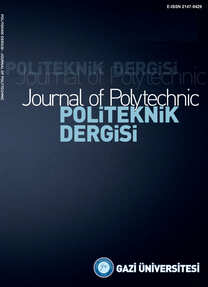Bilgisayar Destekli Eğitimin Bilgisayar Mühendisliği Bölümü Mezunu Öğrenciler Üzerinde Etkisinin İncelenmesi
Analyzing the Effect of Computer-Aided Education on the Graduates of Computer Engineering Department
___
- ) Martínez-Torres, M.R., Toral, S.L., Barrero, F., "Identification of the design variables of eLearning tools", Interacting with Computers, 23(3), 279-288, 2011.
- ) McLarena, B. M., DeLeeuwb, K. E., Mayer, R. E., "A politeness effect in learning with web-based intelligent tutors", International Journal of Human-Computer Studies, 69(1-2), 70-79, 2011.
- ) Wanga, N., Johnsonb, W. L., Mayerc, R. E., Rizzod, P., Shawe, E., Collinsc, H., "The politeness effect: Pedagogical agents and learning outcomes", International Journal of Human-Computer Studies, 66(2), 98-112, 2008.
- ) Sanchez1, E., Garcia-Rodicio, H., "The use of modality in the design of verbal aids in computer-based learning environments", Interacting with Computers, 20(6), 545- 561, 2008.
- ) Papanikolaoua, K. A., Mabbottb, A., Bullb, S., Grigoriadou, educational interactions based on learning/cognitive style and learner behaviour", Interacting with Computers, 18(3), 356-384, 2006. learner-controlled
- ) Johnsona, R. D., Hornikb, S., Salas, E., "An empirical examination of factors contributing to the creation of successful Journal of Human-Computer Studies, 66(5), 356-369, 2008. International
- ) Bakera, R.S.J.d., D'Mellob, S. K., Rodrigoc, M. M. T., Graesser, A. C., "Better to be frustrated than bored: The incidence, persistence, and impact of learners' cognitive- affective states during interactions with three different computer-based learning environments", International Journal of Human-Computer Studies, 68(4) , 223-241, 2010.
- ) Marchioria, E. J., Blancoa, Á. D., Torrentea, J., Martinez- Ortiza, I., Fernández-Manjón, B., "A visual language for the creation of narrative educational games", Journal of Visual Languages & Computing, 22(6), 443-452, 2011.
- ) Price, S., Falcão, T. P., "Where the attention is: Discovery learning in novel tangible environments", Interacting with Computers, 23(5), 499-512, 2011.
- ) Lee, Y., Chong, Q., "Multi-agent systems support for Community-Based Computers, 15(1), 33-55, 2003. Interacting with
- ) Hwanga, W.-Y., Wangb, C.-Y., Hwangc, G.-J., Huangd, Y.-M., Huang, S., "A web-based programming learning environment to support cognitive development", Interacting with Computers, 20(6), 524-534, 2008.
- ) Pfistera, H.-R., Wollstädtera, Peter, S. C., "Affective responses to system messages in human-computer- interaction: Effects of modality and message type", Interacting with Computers, 23(4), 372-383, 2011.
- ) Koutsabasis, P., Stavrakis, M., Spyrou, T., Darzentas, J., "Perceived Impact of Asynchronous E-Learning After Long-Term Development", Internatıonal Journal Of Human- Computer Interactıon, 27(2), 191-213, 2011 for Design and
- ) Pargmana, T. C., Wærn, Y., "Appropriating the use of a Moo for collaborative learning", Interacting with Computers, 15(6), 759-781, 2003.
- ) Pimentela, M d. G., Ishigurob, Y., Kerimbaevc, B., Abowdc, G. D., Guzdialc, M., "Supporting educational activities through dynamic web interfaces", Interacting with Computers, 13(3), 353-374, 2001.
- ) http://www.acikders.org.tr/course/view.php?id=133 Erişim Tarihi: 16.09.2013
- ) Demirdağ, B., Kartal, M., "Anorganik Kimya Dersinde Web Destekli İşbirlikli Öğrenmeye Yönelik Öğrenci Görüşleri", Buca Eğitim Fakültesi Dergisi, 29, 36-49, 2011.
- ISSN: 1302-0900
- Yayın Aralığı: 6
- Başlangıç: 1998
- Yayıncı: GAZİ ÜNİVERSİTESİ
EYÜP BURAK CEYHAN, Şeref SAĞIROĞLU
Topraklarda PCB ve PAH'ların İncelenmesi: Alikahya Bölgesi
Dilara ÇETİNDAMAR, SEVİL VELİ, Tuba ÖZTÜRK, Demet ARSLANBAŞ, SEDA ASLAN KILAVUZ, Şenay DOĞRUPARMAK ÇETİN, ESRA CAN DOĞAN
Güneş Panelleri ile Desteklenmiş Pnömatik Hareket Mekanizması Tasarımı ve İncelenmesi
GÜRKAN SOY, GÜRCAN SAMTAŞ, Salih KORUCU
Beton İçin Geliştirilen Gerilme-Şekil Değiştirme Modellerinin Karşılaştırılması
